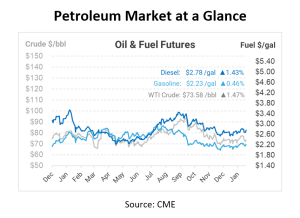
What is That Wednesday – Cardlocks
In the world of commercial and fleet vehicles, all parties involved – from fleet owners to managers and operators – are always on the lookout for ways to cut costs. Well, here’s a solution that has gained popularity: fleet cards. Cardlocks, Over the Road (OTR), and Universal Cards have the potential to help you save money and streamline your operations.
But before you decide which fleet card is right for your fleet, you need to be in the know about the advantages and potential drawbacks. In today’s article, we’re diving into Cardlocks.
What is a Cardlock?
Cardlock Stations are private, non-staffed fueling stations. Unlike traditional retail stations that serve the general public, cardlocks are accessible only to their members, which typically include businesses and organizations with large fleets, such as trucking companies, delivery services, and construction firms.
One of the most significant advantages of Cardlock stations is the competitive fuel prices they can offer. These stations typically price their fuel close to the OPIS (Oil Price Information Service) index price plus a modest markup. In contrast, retail prices can fluctuate around OPIS + a higher markup, resulting in higher prices per gallon. This substantial price difference translates to potential savings, making it an attractive option for cost-conscious fleet managers. You can learn more about the OPIS index here.
Data Management
The cards come equipped with advanced tracking and reporting features, allowing businesses to track their fuel-related expenses.
Therefore, fleet managers can easily track fuel consumption, track fuel expenses in real-time, and calculate fuel efficiency for individual vehicles or the entire fleet. These valuable insights help in optimizing fuel usage, identifying potential issues, and making informed decisions for better cost management.
Drawbacks
While Cardlocks offer numerous advantages, there are also some limitations. One significant drawback is that it requires flexibility in terms of refueling locations, especially for long-haul trucking or deliveries in remote areas.
Finding cardlock stations can be hard for some drivers, especially those who are not familiar with the locations, as the stations may not be as visible or easily accessible as traditional gas stations.
Another consideration is that drivers may need to travel longer distances to reach the cardlock. This can increase fuel consumption, partially offsetting the cost savings achieved through lower fuel prices. Fleet managers should carefully weigh the benefits of lower fuel costs against the potential drawbacks of longer travel distances.
Looking for the best fleet card solution?
Cardlocks are an excellent option for businesses and organizations with large fleets seeking to reduce fuel expenses and gain better control over fuel-related costs. The competitive fuel prices, expense tracking capabilities, and potential savings make it an appealing choice for fleet fueling.
However, it is important to understand your fleet needs before making a choice. Mansfield Energy partners with leading fleet card networks to design the optimal solution for your specific fleet goals or locations.
Mansfield’s team of fleet card experts will analyze your current fueling profile, operational objectives, and transactional detail to show you how fleet cards can help you lower overall fuel procurement costs and increase driver satisfaction. Ready to learn more? Contact us today!
Stay tuned for our upcoming “What Is That Wednesday” article, where we will explore another fleet card option: OTRs!”

This article is part of Daily Market News & Insights
Tagged: cardlocks, Data Management, fleet cards, fuel cards, over-the-road
MARKET CONDITION REPORT - DISCLAIMER
The information contained herein is derived from sources believed to be reliable; however, this information is not guaranteed as to its accuracy or completeness. Furthermore, no responsibility is assumed for use of this material and no express or implied warranties or guarantees are made. This material and any view or comment expressed herein are provided for informational purposes only and should not be construed in any way as an inducement or recommendation to buy or sell products, commodity futures or options contracts.





